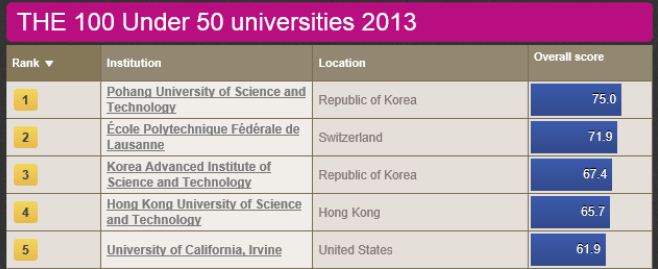
Teaching, Research, and Citations each determined 30% of the overall ranking. International outlook, which represents the reputation in the world and degree of globalization, took 7.5%. Finally, the last 2.5% of the score is from industry income. It assesses participation of the university in development of Industry and how much business supports research. Compared to most universities, POSTECH showed superiority in Teaching, Research, and Industry Income from Industry categories. POSTECH got perfect scores in industry income. With an overall score of 75.0, POSTECH was listed as the first among world universities under 50.
Swiss University, Ecole Polytechnique Federale de Lausanne followed in second place (overall score: 71.9) and POSTECH’s national rival, the Korea Advanced Institute of Science and Technology (KAIST), rose from fifth to third (67.4), while the Hong Kong University of Science and Technology dropped one place to fourth (65.7).
Overall, the UK still has the most representatives in THE’s list, with 18 in the top 100 institutions. This is down from 20 last year, although one of 2012’s entrants Keele University is now too old to be included in the ranking.
Other strong national systems include Australia (13 institutions), the US (eight), France (seven), Spain (six) and Taiwan (five).
Phil Baty, editor of Times Higher Education Rankings, emphasized “South Korea’s first and third place spots make it the “star” of this year’s list. South Korea’s experience shows that it is possible for nations with sufficient political will to build in a relatively short time world-class universities that can compete with the traditional elites in the US and the UK.”
м Җмһ‘к¶Ңмһҗ © нҸ¬н•ӯкіөлҢҖмӢ л¬ё л¬ҙлӢЁм „мһ¬ л°Ҹ мһ¬л°°нҸ¬ кёҲм§Җ


